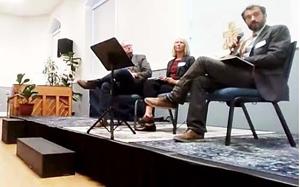
LOGAN – None of the Republicans running for local state offices showed up for a recent candidate forum on Aug. 26, leaving their challengers to set the agenda for the discussions that followed.
The hopeful candidates attending the event, sponsored by the Cache Valley League of Women Voters, were Tom Liljegren, a Democrat running against incumbent Rep. Mike Petersen (R-House Dist. 2); Patrick Belmont, an unaffiliated candidate running against River Heights Mayor Jason Thompson for House District 3; and Nancy Huntley, a Democrat trying to unseat incumbent Sen. Chris Wilson in Senate District 2.
Belmont and Huntley – both professors at Utah State University involved in environmental and water studies – cited energy and climate change as among the most pressing issues facing Utah and Liljegren was happy to agree.
Responding to previously submitted question via E-Mail, Petersen endorsed Utah’s all-of-the-above approach to energy solutions, including the potential promise of renewable sources like geothermal and nuclear energy as well as tried and true energy sources like coal, natural gas and oil.
That response drew criticism from all three of the challengers at the forum.
Liljegren criticized the state’s current energy policy as being too heavily dependent on coal and oil, neither of which are sustainable and contribute to regional problems of air pollution.
Rather than sticking to policies designed to satisfy specials interests and businesses, Leljegren said that Utah should pursue energy solutions by “thinking outside the box,” but didn’t offer any specific suggestions.
All three of the candidates present also took their turn condemning gerrymandering by the Utah Legislature.
A recent ruling by the Utah Supreme Court has reignited that issue and prompted lawmakers to meet in a special session in Salt Lake City.
Utah voters passed a ballot initiative in 2018 to create an independent commission to redraw maps for Utah’s congressional districts, a process that takes place every ten years following the Census.
In 2021, however, the Republican majority in the Legislature opted to ignore that commission’s recommendations and drew its own districts.
In a lawsuit, the League of Women Voters of Utah had argued that the Utah Legislature violated Utahns’ constitution right to alter and reform the state government when lawmakers repealed and replaced that citizen-driven ballot initiative.
In July, the Utah Supreme Court reversed a lower 3rdrd District Court ruling that had dismissed the LWVU claim, confirming that the Legislature had exceeded his constitution authority.
Utah lawmakers quickly reconvened in August and passed a controversial amendment to the state constitution giving themselves the authority that the Supreme Court had denied.
Although the furor over the gerrymandered district boundaries mostly focuses on the Democratic bastion of Salt Lake City, Belmont also cited political bias in the way that the boundaries were drawn in his own House District 3.
Belmont called that gerrymandering an “attempt to undermine democracy.”
All three candidates also agreed that state public education is underfunded.
In Utah’s record $29 billion budget approved by the Legislature in 2024, lawmakers allocated a more than $211 million boost for the Weighted Pupil Unit; an extra $40 million for the Utah Fits All Scholarship program; $8.4 million for 1,400 previously unpaid student teachers; $8.4 million in one-time funds for school supplies; $74 million for over-time pay; $150 million for teachers bonuses; $100 million for school security; $100 million for firearm instruction for teachers; and $35.5 million in one-time funds to ease the public school’s transition away from charging activity fees starting in the 2025-26 academic year.
The challengers still insisted that funding was inadequate, however.
The candidate forum was held at the First Presbyterian Church at 178 West Center Street in Logan.

